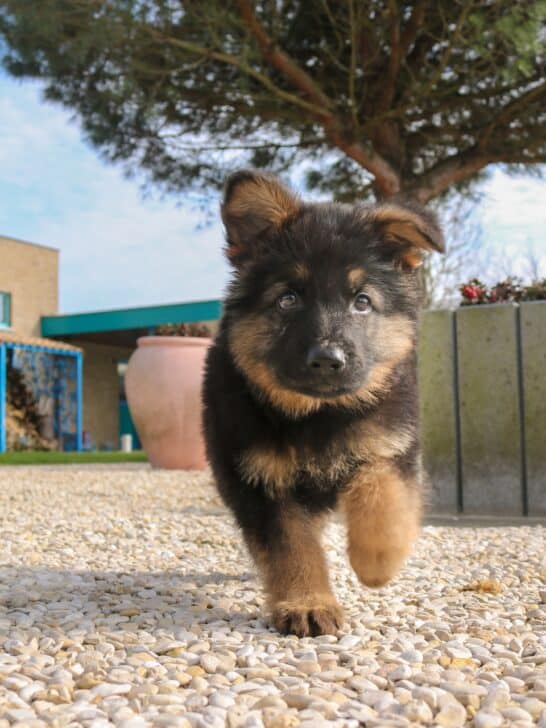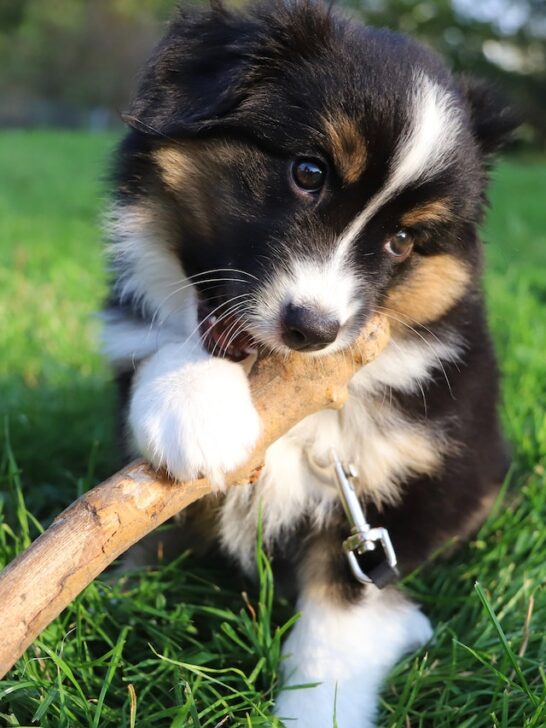Why Do German Shepherds Cry & Whine? What’s Normal & What Isn’t
Whining, crying, whimpering – these are all sounds German Shepherd owners know well. It can be upsetting to both you and your dog to not know what is wrong and how to respond!
Why Do German Shepherds Cry?
There can be many different reasons, as we will look at here shortly. But the most consistently cited reason is simply this: crying is how your German Shepherd “talks” to you.

Listen to German Shepherd Puppies Crying
As this breeder-made YouTube video clearly illustrates, a crying German Shepherd puppy can be adorably cute.
But what happens when your GSD gets bigger…and bigger…and bigger…and the crying gets louder…and louder…and louder?
As this keeper made YouTube video showcases, many German Shepherds still cry when they grow up.
So what happens when, no matter what you try, the crying behavior just won’t stop? What then?
That is what we are going to spend the rest of this article focuses on.
Understanding the German Shepherd Dog Breed Temperament & Personality
The German Shepherd dog breed is extremely popular in the United States and around the world.
In the USA, the American Kennel Club (AKC) actually keeps track of the most popular purebred dog breeds.
Guess where the German Shepherd breed ranks? The GSD is currently number two out of 195 registered purebred dog breeds!
So clearly, GSD owners have learned to peacefully co-exist with the constant vocalizations of this dog breed.
German Shepherds have many amazing qualities that make this dog so popular. They are loving, loyal, protective, affectionate, intelligent, athletic, great with family members of all ages, and brave.
But many first-time GSD owners are not prepared for what some might call neediness in this particular dog breed. GSDs have been bred specifically to live and work very closely with “their” people.
A German Shepherd dog that is not given adequate “you time” is going to become distressed. Other dogs are not a substitute for human companionship, playtime, and affection.
A lonely, bored, or neglected German Shepherd can easily turn destructive or even aggressive, which is one of the major reasons why GSDs are relinquished to rescues such as the Missouri German Shepherd Rescue charity.
German Shepherds Are Sensitive Working Dogs
The German Shepherd dog breed is a true working dog breed.
While today there are two distinct German Shepherd breeding lines – the “show” line and the “working” line – the original GSDs were working the dog through and through.
And in fact, as Wildhaus Kennels points out, there are actually three distinct breed lines today: the American show line, the German show line, and the European working line.
There are also several sub-sections of each of these three major umbrella breed lines.
But if you trace your dog’s lineage back far enough, you are likely to run into a pair of working dog ancestors, which means work ethic runs through your dog’s veins.
And working dogs will develop personality and temperament traits that are very specific to the type of jobs they are bred to perform.
German Shepherds have always been bred to perform people-centric work. Here are just some of the many jobs German Shepherds are in high demand to perform:
- Guarding and protection
- Police and military K-9
- The service dog and guide dog to the blind
- Canine therapy dog work
- Herding and livestock guarding
- Search and rescue and nose work
- Hunting and tracking
- Canine athletics such as agility and dock diving
In each one of these job descriptions, you can visualize two partners: a human partner paired with a canine partner.
Any working dog breed that has been developed and bred specifically to work closely with a human partner is going to be intelligent, perceptive, and extremely sensitive.
German Shepherds fit this description perfectly.
Can German Shepherds Be Trained Not to Cry?
As WagWalking.com explains, one key to at least minimize the vocalization of a German Shepherd dog is to be sure to spend enough time with your dog.
The German Shepherd is actually not known to be a barker, but barking will increase if your dog becomes lonely or bored.
In the same way, German Shepherd crying, whimpering and whining can turn from simply attempts to talk to you into pleas for attention, time and affection if not enough of that is readily available.
There is really no way to train your German Shepherd dog to be a different type of dog than the GSD breed is known to be.
But there are some ways to keep the natural vocalizations of your German Shepherd from turning into real problem behaviors of the type that may get you into hot water with neighbors or housemates or even the local community.
Tips to Train German Shepherd Not to Cry So Much
Whenever you are dealing with a very smart dog breed that is highly attuned to their human carers, you can bet your dog will notice what gets your attention fastest.
Then your dog will do more of that. After all, your German Shepherd loves attention from you! Unlike you, your dog’s whole world revolves around you.
So anything your GSD can do to keep your attention on them is a good thing to do more of.
This means you will need to start paying more attention to the things your dog does that send you running to them.
When your GSD starts whimpering, whining, or crying, for instance, you will have to stop yourself from immediately responding.
The earlier you can start to teach your dog that potential “problem” behaviors will not generate an instant response from you, the better.
In this section, we will look at specific tips to train your German Shepherd not to cry so much. We will look at tips for GSD puppies, adult dogs, and rescue dogs.
Train your German Shepherd puppy not to cry so much
One of the most common issues new German Shepherd puppy keepers face is trying to crate train a new GSD puppy.
Crate training can be an invaluable addition to your training protocols!
Yet, as PetMD points out, your puppy is often already dealing with a lot of changes when crate training begins.
Your GSD puppy is trying to learn to sleep apart from mom and littermates for the first time. Your puppy is in a strange new place with a new family and new surroundings.
Suddenly there are lots of rules and regulations, potty training issues, leashes and collars to get used to, veterinary visits, and then….the dog crate.
This means that regardless of what breed of puppy you are crate training, some crying and whining are just going to come with the territory.
So here are expert tips to help your GSD puppy understand that whining and crying will not get them out of crate training.
1. Do not respond to the crying behavior when it first starts – wait until your puppy quiets down before approaching the crate.
2. Make sure the crate is puppy-sized – your GSD puppy should be able to stand up and turn around, but if you can fit two GSD puppies inside it, it is too large.
3. Take time to get your GSD puppy familiar with the crate structure itself – practice going in and out the door, do short sits at first, offer lots of praise and rewards.
4. Don’t make your GSD puppy sit inside the crate too long to where accidents are more likely to occur – also give your puppy a potty break before each crate training session.
5. Make the crate very comfy for your GSD puppy by putting in toys, a soft bed, blankets, something that smells like you and/or some treats.
6. Put the crate in a place where you are still visible at first so your puppy will not feel abandoned and start to cry in a panic.
Train your German Shepherd adult dog not to cry so much
When it comes to training an adult GSD dog not to cry or whine so much, it is all about setting reasonable expectations, as this VetStreet owner thread highlights.
After all, you have chosen a vocal dog breed with a high need and drive to be near you and in constant communication with you.
If you set a goal for yourself to completely eliminate your German Shepherd dog’s crying and whining, you are likely to get quickly frustrated and conclude it is not possible.
But if you set a goal to simply reduce the amount of crying or whining, you are likely to have a much better chance of reaching your goal.
Here are some tips to help encourage your German Shepherd to stop seeing crying or whining behavior as an effective way of getting your attention quickly.
1. Make a list.
Start making a list of each time your German Shepherd whines and what was going on just before the crying started.
This can help you identify certain issues that may cause your GSD to whine more – is it just before dinner time?
Is it time for the evening walk? Is there some other routine your dog remembers that you have forgotten?
This will also help you identify when crying might be prompted by discomfort, illness, boredom, loneliness, or some other reason.
The more you can separate out normal “reminder” cries from distress cries, the better your human-to-canine communication will become.
2. Stop responding to the crying right away.
Crying or whining can be an auditory irritant – no doubt about it. No matter how much you love your dog, having to listen to constant crying can get on your nerves!
So instead of responding right away to try to make the sound stop, task yourself to take several deep breaths and count to 10, or 15, or 20.
Wait until the whining at least lessens or (ideally) stops before responding.
3. Ask yourself if you can add anything to your dog’s day to replace the whining.
Because crying is so often associated with boredom or loneliness, it may just be that adding in an extra walk or play session (or booking a dog walker to do these things if you don’t have time) may cut down on the crying very naturally.
Train your German Shepherd rescue dog not to cry so much
German Shepherds are so sensitive that being relinquished and re-homed can be especially hard on this dog breed.
You may get your new GSD rescue pup home only to discover your dog develops a full-blown case of separation anxiety whenever you are not clearly visible and available to your dog.
As All Shepherd Rescue charity explains, separation anxiety can be a much bigger problem to address than simply removing social reinforcement for the behavior.
Your dog isn’t just a little bored or slightly lonely. Your GSD is panicked!
Don’t be afraid to enlist the help of a professional dog trainer if you find that managing separation anxiety in a re-homed GSD is beyond what you feel comfortable coping with alone.
It often takes a combination approach that may include environment and behavioral changes, canine medication, and re-training to help your dog feel more comfortable without needing 24/7 you-time.
Making use of a dog walker, doggie daycare, or a friendly dog-loving neighbor or friend when you have to be out can spell you during the re-training process.
Ideally, no one would choose a German Shepherd dog without knowing in advance that these dogs tend to be naturally vocal. Yet it happens every day.
There is so much to learn about the German Shepherd dog breed that sometimes the vocalization habits just get overlooked.
Now that you understand your experience with GSD crying is not unique to you and your dog, you can start taking steps to reduce the crying behaviors.
























